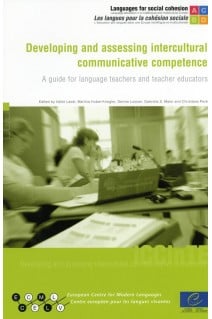



The CD-Rom content is available here: http://archive.ecml.at/mtp2/iccinte/results/en/index.htm
Many language teachers, teacher educators and second language acquisition researchers have expressed the conviction that the primary aim of foreign language teaching is to enable learners to communicate with people from different linguistic and cultural backgrounds in an increasingly multicultural world. The aim of this publication is to assist teacher educators and language teachers in shifting the focus from linguistic competence to intercultural communicative competence.The printed booklet of the present guide contains the introductions to:
* definitions of key terms in intercultural communication; * planning and designing intercultural communication courses and workshops;* teaching/training methods and materials;* assessing intercultural communicative competence.The materials on the accompanying CD-Rom include:* the theoretical background to teaching language and culture;* detailed workshop and course planning guidelines;* teaching materials and activities based on literature, films and songs;* guidelines and tasks for assessment and descriptors of competences;* intercultural communication workshop reports;* our research articles about the intercultural dimension of FIT.
All of the materials in this publication are based on our research and the lessons we learnt from the training sessions we held in 12 European countries within the framework of the ICCinTE project of the ECML between 2004 and 2006. This guide can be used independently or it can complement our intercultural communication textbook Mirrors and windows in order to help incorporate intercultural communication training into foreign language teaching and teacher education more systematically.
Part 1: Guidelines for the teaching of intercultural communicative competence (ICC)
1. Introduction
2. Theoretical background
2.1 Defining culture and Culture
2.2 Cultural awareness and the process of acculturation
2.3 Intercultural communication and intercultural communicative competence in language teaching
3. Planning intercultural communication workshops
3.1 Who will be the participants of the workshop or course?
3.2 Why do you hold this workshop?
3.3 What will you teach?
3.4 How will you do the training?
3.5 Evaluation of intercultural communication training sessions
3.6 Final checklist before you start teaching the workshop or course
4. Materials and activities to develop intercultural competence
4.1 Introduction - Intercultural competence through literature, films and songs
Part 2: Guidelines for the assessment of intercultural communicative competence (ICC)
1. Introduction
2. Conceptual framework of reference for ICC
2.1 Theoretical aspects
2.2 Dimensions of ICC
3. Assessing the three dimensions of ICC
3.1. Assessing mtercultural knowledge/savoirs
3.2. Assessing intercultural know-how/savoir-faire
3.3. Assessing intercultural being/savoir-être
4. Methods of assessment
5. Steps in assessing ICC
6. Assessing ICC: an example through an authentic learning unit
7. Final appreciation: levels of performance in assessing ICC
8 Conclusion: limitations and teachers' intercultural competence
8.1 Limitations
8.2 Survey instruments to assess teachers' competence in ICC
9. Preview of the CD-Rom
Part 3: The Authors

The CD-Rom content is available here: http://archive.ecml.at/mtp2/iccinte/results/en/index.htm
Many language teachers, teacher educators and second language acquisition researchers have expressed the conviction that the primary aim of foreign language teaching is to enable learners to communicate with people from different linguistic and cultural backgrounds in an increasingly multicultural world. The aim of this publication is to assist teacher educators and language teachers in shifting the focus from linguistic competence to intercultural communicative competence.The printed booklet of the present guide contains the introductions to:
* definitions of key terms in intercultural communication; * planning and designing intercultural communication courses and workshops;* teaching/training methods and materials;* assessing intercultural communicative competence.The materials on the accompanying CD-Rom include:* the theoretical background to teaching language and culture;* detailed workshop and course planning guidelines;* teaching materials and activities based on literature, films and songs;* guidelines and tasks for assessment and descriptors of competences;* intercultural communication workshop reports;* our research articles about the intercultural dimension of FIT.
All of the materials in this publication are based on our research and the lessons we learnt from the training sessions we held in 12 European countries within the framework of the ICCinTE project of the ECML between 2004 and 2006. This guide can be used independently or it can complement our intercultural communication textbook Mirrors and windows in order to help incorporate intercultural communication training into foreign language teaching and teacher education more systematically.
Attention, en vertu de nos conditions générales de vente, l'achat des PDF/epub est réservé aux particuliers.
